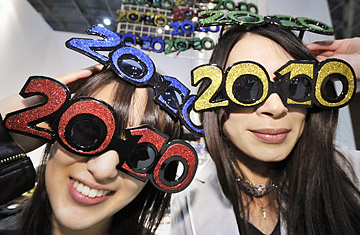
It's that time of year again: the prognosticators are out in full force. What will the year 2010 bring? To find out, all you have to do is turn on a computer or TV. You'll quickly learn that next year we're going to eat fried chicken and whoopie pies, view televised sports in 3-D, witness six to eight hurricanes in the Atlantic, watch as Ruth Bader Ginsburg retires from the Supreme Court and tune in to Sarah Palin's new talk show.
Then there are the financial forecasts. No one loves a look at the year ahead more than the folks who manage money for a living (or who sell advice about how to manage it). That makes perfect sense. Unlike the people predicting, say, the rise of homemade beer, the professionals who get paid to grow portfolios really ought to have a handle on the future. What's the best way to make money? Figure out what's about to go up in value and buy a lot of it before anyone else catches on.
So what are the sages saying now that 2010 is just around the corner? Plenty. Next year we'll see oil hit $90 a barrel (per Goldman Sachs), unemployment peak at 10.5% (Fitch Ratings), the value of the dollar with respect to the euro and yen hit bottom (Deutsche Bank), 10-year Treasuries yield more than 4% (Bank of America Merrill Lynch) and small-cap value stocks outperform all other categories (Richard Bernstein Capital Management). As for the stock market more broadly? Strategists at UBS expect gains well into the double-digits. The CEO of PIMCO sees a 10% drop.
Wait a second. Will the stock market go up or down? That major discrepancy raises an important point. Making predictions a year out is a tricky — and unreliable — business.
A good illustration of that: right now there are two main schools of thought on the direction the economy will take in 2010, and they couldn't be more dissimilar. J.P Morgan Chase's chief U.S. equity strategist Thomas Lee is an advocate of the more optimistic outlook. He sees the Federal Reserve keeping interest rates low, credit rushing back in to households and small businesses, consumer demand taking off, employment rebounding and the S&P 500 rising 18%.
At the other end of the spectrum are the likes of David Rosenberg, chief economist and strategist at Gluskin Sheff. He holds that this year's stock-market uptick can be almost entirely credited to government intervention and stimulus, and that the true, underlying trend of tighter credit and reduced spending will re-assert itself and be with us for years to come. "We have said repeatedly that this recession is really a depression," Rosenberg recently wrote.
One of these outlooks is going to be proven wildly wrong. So then why venture such big, bold guesses at the future in the first place? Well, because one forecast might be close enough to right to pay off handsomely. "A lot of unexpected things happen each year, and you can make a lot of money as long as you get some of them right," says Byron Wien, a Blackstone Group vice chairman who puts out an annual list of ten surprises for the following year. "If you cut your losses on what you get wrong and let your winners runs, you can do very well."
Even the ritual of formalizing forecasts by way of public pronouncement serves a purpose. "You think about this stuff all the time when you're in the business, but there's this time in December or January when you put it on paper," says Bob Doll, BlackRock's chief investment officer of global equities, another strategist known for his annual predictions. "It gives you something to point back to and say, What did I get right and wrong and what did I learn from it?"
Doll doesn't put out his forecast until January, but already clients are clamoring for it. Why? "They're curious, and they're trying to figure out what to do themselves," he says. Accurate or not, a forecast is something to hold onto. Or maybe we just sleep better having bet on someone else's guess rather than our own.
